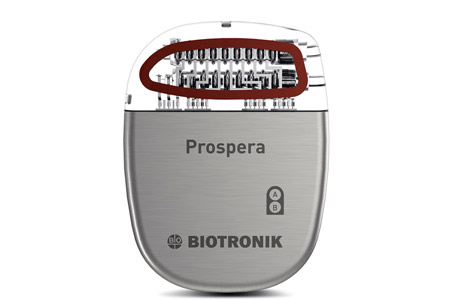BIOTRONIK Neuro will unveil new data from the BENEFIT-03 clinical study. The findings highlight the transformative potential of its ProsperaTM Spinal Cord Stimulation (SCS) system.
This system integrates RESONANCE™ multiphase stimulation with automatic, objective, daily remote monitoring and proactive care* to optimize management of SCS patients' chronic pain.1 The 24-month data revealed that participants experienced significant pain relief, along with better sleep, improved function and reduced opioid medication use. Patients and clinicians reported positive experiences with the Prospera SCS system's remote monitoring and remote programming capabilities, which enabled rapid resolution of issues to optimize therapy and reduced burdens for both patients and clinicians.
The 24-month interim data are from BENEFIT-03, a prospective, multicenter study in Australia that is the first and only long-term clinical trial evaluating the impact of SCS with real-time† remote monitoring in patients with chronic low back and/or leg pain.
"BENEFIT-03 results highlight the sustained benefits of the Prospera SCS system and demonstrate how its proactive care capabilities—enabled by automatic, objective daily remote monitoring and programming—significantly improve patient outcomes," said Leonardo Kapural, MD, PhD, Professor of Anesthesiology at Florida Atlantic University and Physician at Carolinas Pain Institute and Center for Clinical Research. "These findings support the adoption of such monitoring technologies and proactive interventions as the standard of care in spinal cord stimulation therapy, given the potential for rapid identification and resolution of issues that help maintain patients' therapeutic goals over time."
Additional 24-month BENEFIT-03 results demonstrated:
Rapid issue resolution: Remote monitoring detected SCS issues for all participants, enabling intervention in 2.9 days, vs. more than 7.2 days with standard in-clinic SCS care.2 The most common issues were low device usage and therapeutic amplitude outside the prescribed setting.
Reduced patient time and costs: At 24 months, 95% of participants reported that remote adjustments saved money, and 100% said they allowed more time for daily activities. Clinicians reported remote management reduced staff burdens in the management of 82% of participants and estimated that remote care prevented an average of 5.4 in-office visits per participant through 24 months, with the highest need participants avoiding an average of 12 visits, substantially reducing travel time and costs.
"We're encouraged to see the continued strong results over time with the Prospera SCS system, which demonstrate its potential to advance patient care and address the challenges SCS patients face," said Todd Langevin, BIOTRONIK Neuro President. "This evidence reinforces the growing body of research supporting proactive care and remote monitoring as effective strategies to optimize pain relief and mirror the real-world benefits our customers report."
About The Prospera Spinal Cord Stimulation System:
The Prospera Spinal Cord Stimulation system – with remote monitoring and proactive care via the Embrace One Care Team – delivers RESONANCE™, the only multiphase stimulation paradigm available. BIOTRONIK Neuro is the first and only manufacturer to offer daily remote monitoring, automatic objective data transmission and remote programming in the SCS space. This system allows therapy adjustments in real time, reducing the need for frequent in-person visits. By facilitating faster issue identification and management, Prospera enables therapy optimization, which may improve long-term outcomes for patients with chronic intractable pain. The Prospera SCS system is FDA-approved and available in the U.S.
Remote Management of Spinal Cord Stimulation Devices for Chronic Pain
Spinal cord stimulation is a proven, widely used treatment for chronic pain, delivering electrical impulses to the spinal cord to modulate nerve activity and reduce pain signals. While clinical studies confirm its long-term effectiveness, real-world challenges like loss of efficacy and device explant remain prevalent.3-11 Traditional SCS systems often require frequent in-office visits for reprogramming, resulting in therapy delays, patient travel burdens, and higher costs.
Emerging expert recommendations highlight the potential benefits of SCS systems with remote monitoring capabilities, which enable timely adjustments, minimize in-person visits, and may improve long-term outcomes by enhancing therapy management and patient convenience.
About BIOTRONIK Neuro:
BIOTRONIK Neuro is a division of BIOTRONIK, a leading medical device company that has been improving the lives of patients with heart and blood vessel diseases for decades. Leveraging BIOTRONIK's advanced cardiovascular technologies, BIOTRONIK Neuro has created a new approach to spinal cord stimulation (SCS) therapy management: one that's not just implanted, but truly connected to the needs of patients and providers. Our goal is to redefine relief for patients experiencing chronic pain and to optimize the SCS experience daily, and over the lifetime of patient therapy. BIOTRONIK Neuro is based in Lake Oswego, Oregon.


